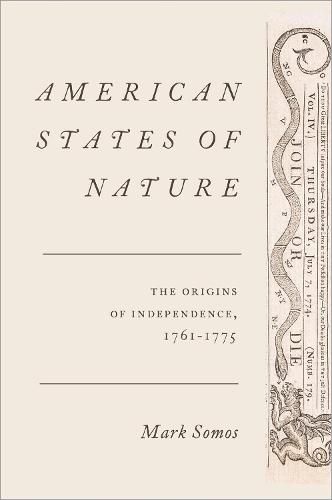Readings Newsletter
Become a Readings Member to make your shopping experience even easier.
Sign in or sign up for free!
You’re not far away from qualifying for FREE standard shipping within Australia
You’ve qualified for FREE standard shipping within Australia
The cart is loading…






American States of Nature transforms our understanding of the American Revolution and the early makings of the Constitution. The journey to an independent United States generated important arguments about the existing condition of Americans, in which rival interpretations of the term state of nature played a crucial role. State of nature typically implied a pre-political condition and was often invoked in support of individual rights to property and self-defense and the right to exit or to form a political state. It could connote either a paradise, a baseline condition of virtue and health, or a hell on earth. This mutable phrase was well-known in Europe and its empires. In the British colonies, state of nature appeared thousands of times in juridical, theological, medical, political, economic, and other texts from 1630 to 1810. But by the 1760s, a distinctively American state-of-nature discourse started to emerge. It combined existing meanings and sidelined others in moments of intense contestation, such as the Stamp Act crisis of 1765-66 and the First Continental Congress of 1774. In laws, resolutions, petitions, sermons, broadsides, pamphlets, letters, and diaries, the American states of nature came to justify independence at least as much as colonial formulations of liberty, property, and individual rights did. In this groundbreaking book, Mark Somos focuses on the formative decade and a half just before the American Revolution. Somos’ investigation begins with a 1761 speech by James Otis that John Adams described as a dissertation on the state of nature, and celebrated as the real start of the Revolution. Drawing on an enormous range of both public and personal writings, many rarely or never before discussed, the book follows the development of America’s state-of-nature discourse to 1775. The founding generation transformed this flexible concept into a powerful theme that shapes their legacy to this day. No constitutional history of the Revolution can be written without it.
$9.00 standard shipping within Australia
FREE standard shipping within Australia for orders over $100.00
Express & International shipping calculated at checkout
Stock availability can be subject to change without notice. We recommend calling the shop or contacting our online team to check availability of low stock items. Please see our Shopping Online page for more details.
American States of Nature transforms our understanding of the American Revolution and the early makings of the Constitution. The journey to an independent United States generated important arguments about the existing condition of Americans, in which rival interpretations of the term state of nature played a crucial role. State of nature typically implied a pre-political condition and was often invoked in support of individual rights to property and self-defense and the right to exit or to form a political state. It could connote either a paradise, a baseline condition of virtue and health, or a hell on earth. This mutable phrase was well-known in Europe and its empires. In the British colonies, state of nature appeared thousands of times in juridical, theological, medical, political, economic, and other texts from 1630 to 1810. But by the 1760s, a distinctively American state-of-nature discourse started to emerge. It combined existing meanings and sidelined others in moments of intense contestation, such as the Stamp Act crisis of 1765-66 and the First Continental Congress of 1774. In laws, resolutions, petitions, sermons, broadsides, pamphlets, letters, and diaries, the American states of nature came to justify independence at least as much as colonial formulations of liberty, property, and individual rights did. In this groundbreaking book, Mark Somos focuses on the formative decade and a half just before the American Revolution. Somos’ investigation begins with a 1761 speech by James Otis that John Adams described as a dissertation on the state of nature, and celebrated as the real start of the Revolution. Drawing on an enormous range of both public and personal writings, many rarely or never before discussed, the book follows the development of America’s state-of-nature discourse to 1775. The founding generation transformed this flexible concept into a powerful theme that shapes their legacy to this day. No constitutional history of the Revolution can be written without it.